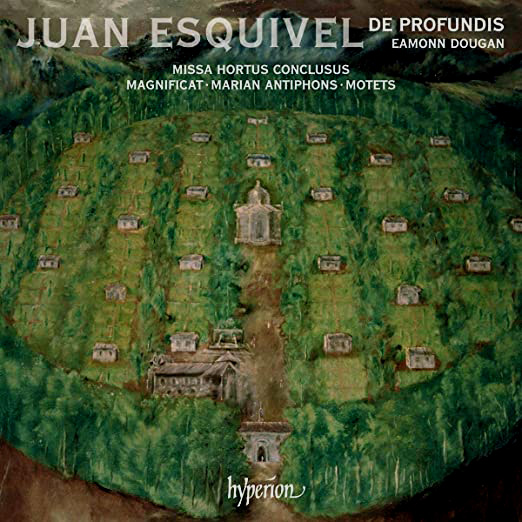
ESSENTIAL RECORDINGS

Regina caeli Hortus conclusus (Rodrigo de Ceballos) Kyrie - Missa Hortus Conclusus Gloria - Missa Hortus Conclusus Veni, Domine Credo - Missa Hortus Conclusus Ego sum panis vivus Sanctus - Missa Hortus Conclusus Agnus Dei - Missa Hortus Conclusus Ite, missa est - Deo gratias - Missa Hortus Conclusus Alma redemptoris mater Magnificat quinti toni Ave regina caelorum Nunc dimittis Sancta Maria Te lucis ante terminum Salve regina
Those of you who enjoy the highly polished purity of Renaissance vocal polyphony and the deeply religious context it was set to, will be glad to hear that this recording presents recently discovered works by Spanish composer Juan Esquivel (c1516-c1630), a contemporary of Victoria and Guerrero.
Juan Esquivel's reputation was elevated by the discovery of a massive book, printed in 1613, containing Psalms, thirty hymns, sixteen Magnificats, Marian antiphons and a Te Deum, et al., together with his second book of Masses - six of them - plus a setting of the Missa pro defunctis and Responds for the dead. All these in one great volume of 598 pages constitute one of the largest music collections of the time. It was discovered in 1973 at the collegiate church of Santa Maria de la Encarnacin in Granada. The sacristan, as a boy, had hidden the Esquivel volume and some old chant books during Spain's civil wars in the 1930s. It is from that cornucopia that much of this recording's music has been transcribed. {Bruno Turner - Hyperion}
The Kyrie of the Mass itself uses the melody from a Motet by Rodrigo de Ceballos as the catalyst or genesis for the harmonic layout of the whole work. The predominantly four-part vocal structure of the music covers a wide pitch range and serves up some elaborate counterpoint. Since vocal music during the Renaissance could only be performed by male voices, the 22 strong all-male ensemble De Profundis, founded in 2011, brings a feel of authenticity to the music. Their perfectly matched numbers of six alto, six tenor, six baritone and four bass voices generate a highly uniform yet dynamic sound. And director Eamonn Dougan's emphasis on contrapuntal precision, focusing on each voice as they overlap, makes for a richly textured sonic tapestry that if anything, elevates the soul. The audio recording itself took place inside a church and sets the perfect acoustic ambience for this type of music.
Jean-Yves Duperron - April 2020